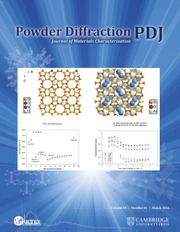Article contents
Crystal structure of 3-[(3,4-dinitro-1H-pyrazol-1-yl)-NNO-azoxy]-4-nitro-1,2,5-oxadiazole
Published online by Cambridge University Press: 06 April 2021
Abstract
The crystal structure of a novel high-energy density material 3-[(3,4-dinitro-1H-pyrazol-1-yl)-NNO-azoxy]-4-nitro-1,2,5-oxadiazole C5HN9O8 was determined and refined using laboratory powder diffraction data. The diffraction data and database analysis were insufficient to distinguish two candidate structures from the solution step. Density functional theory with periodic boundary conditions optimizations were used to choose the correct one. 3-[(3,4-Dinitro1H-pyrazol-1-yl)-NNO-azoxy]-4-nitro-1,2,5-oxadiazole crystallizes in space group Pbca with a = 8.3104(2) Å, b = 14.2198(5) Å, c = 19.4264(7) Å, V = 2295.66(14) Å3. The molecular conformation contains a weak intramolecular hydrogen bond C–H⋯O–N, and the structure is dominated by weak O⋯π and O⋯O contacts.
Information
- Type
- New Diffraction Data
- Information
- Copyright
- Copyright © The Author(s), 2021. Published by Cambridge University Press on behalf of International Centre for Diffraction Data
References
- 3
- Cited by


